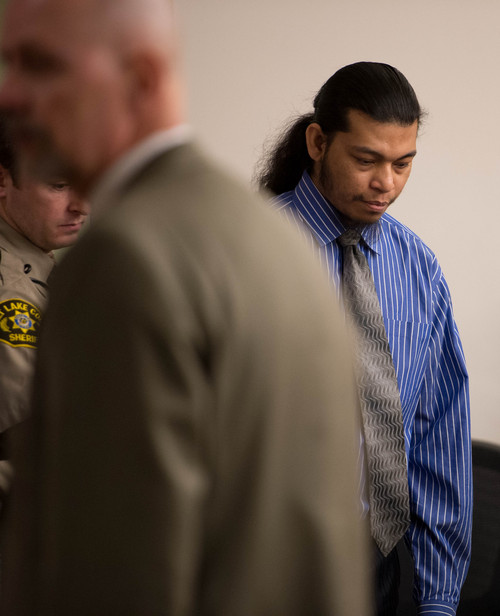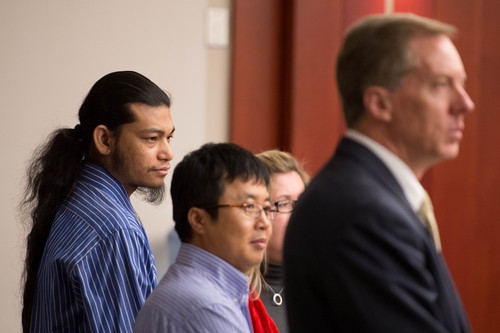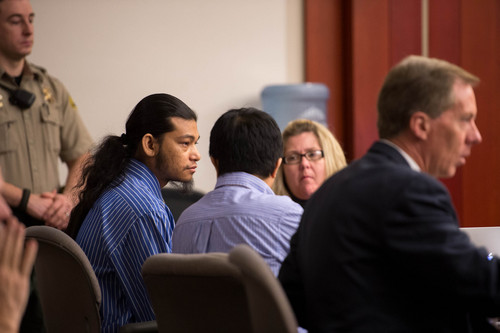This is an archived article that was published on sltrib.com in 2014, and information in the article may be outdated. It is provided only for personal research purposes and may not be reprinted.
A prosecutor told jurors Tuesday that trial evidence will prove that a Burmese refugee kidnapped, raped and killed a young girl at the South Salt Lake apartment complex where they both lived in March 2008.
Esar Met, 27, is charged in 3rd District Court with first-degree felony counts of child kidnapping and aggravated murder for the slaying of 7-year-old Hser Ner Moo.
But the defense claimed Met "loved kids" and hinted that someone else must have killed the girl.
Prosecutor Matthew Janzen began his opening statement by saying: "Today we are here to discuss the life of a girl named Hser Ner Moo."
"Hser Ner Moo was healthy and happy," Janzen told jurors. "She was excited for life and she went out to play, never to return."
Eleven jurors — comprised of eight jurors and three alternates — were chosen Monday to hear the three-week-long trial.
Hser Ner Moo girl disappeared on March 31, 2008, prompting hundreds of volunteers to search for her before police found her body in Met's basement apartment the next night.
Her family lived in the same complex and the child was acquainted with Met, who had just arrived to the U.S. a month before the murder. He had no job, would stay home and played with kids in complex, according to Janzen.
Hser Ner Moo was found by police face down in Met's shower, still in the pink shirt, pink skirt and pink coat she had wore the day before. Police have said the girl was likely dead within an hour of leaving her family's nearby apartment.
"Evidence will prove beyond a reasonable doubt that Esar Met killed Hser Ner Moo after he sexually assaulted and detained her," Janzen said.
But defense attorney Michael Peterson said that "Esar Met loved kids. He played games with them, took them for bike rides, cooked food, gave them treats."
Peterson added that Met was "never inappropriate."
Peterson dismissed DNA evidence allegedly tying Met to the girl's death as a product of the girl and Met playing games together.
Peterson said that when Met saw his uncle at 3 p.m. on the day Hser Ner Moo disappeared, Met seemed normal, calm and unsuspicious.
Peterson painted a picture of Met's relationship with his four roommates as cold — influenced by their being from different ethnic groups.
The roommates "don't go out and help" search for the missing girl, despite fact that they knew Hser Ner Moo's family, Peterson said. And they didn't ask Met if he had seen her.
Met's four roommates were arrested April 1, 2008, but later released. Police said at the time that the four men were not home when the girl was killed and did not know her body was in Met's basement bathroom.
On Monday, prosecutors and defense attorneys questioned each potential juror at length about their ability to remain objective and fair — presuming Met to be innocent unless proven guilty by the evidence presented at trial — in the face of the gruesome killing of such a young girl.
Several people admitted this would be a problem.
"Because it involves a child, that makes it a lot harder for me to presume he's innocent," said juror number 36, a young mother with blond hair. "I have a 6-year-old at home. I think it would be very hard for me to see some of the evidence."
Of the 11 chosen to sit on the trial jury, a number said they have young children. Several recalled early reports of Hser Ner Moo's disappearance — including one man, who said the search party knocked on his Sugar House door — but few followed the case in the years since.
This week's trial is the culmination of years of proceedings that experienced several setbacks and raised concerns over the defendant's mental competence and ability to understand the criminal proceedings.
Last month, Senior Judge Judith Atherton denied defense attorneys' request to suppress evidence found in Met's basement apartment that they said was searched illegally, without his consent.
Police and FBI agents, who received permission to search the apartment from Met's roommates, found spots of dried blood on the carpet and blood spatter on a wall of a room, which led them to the bathroom where Hser Ner Moo's body was found.
Defense attorneys also asked the judge to exclude certain photographs from the trial that, the defense argued, are "too gruesome" for jurors. They suggested prosecutors use non-offensive diagrams instead.
Prosecutors called the photos relevant, saying they show the brutality with which the child was killed and the injuries she suffered.
"The person who did this, who dragged her into the shower and left her, intended her to die," prosecutor Robert Parrish said. "They are not gruesome photographs in and of themselves."
Atherton later ruled that only two photos — one depicting the 7-year-old girl crumpled inside a bathroom stall; the other, a photo of the girl's bruised and damaged genitals — could be used at trial.
Other issues surrounding Burmese interpreters, including finding qualified court interpreters, have plagued the case.
During an evidentiary hearing last month, Win Zaw Aungo testified that after telling a police officer at the murder scene that he knew the young girl's parents and wanted to know how he could help, he was sent to the South Salt Lake police station.
When he arrived there, Aungo — who speaks both Burmese and English — was asked by police if he could interpret some interviews, he testified, including an interview with Esar Met.
It was lost in translation that Aungo was not actually hired by the FBI to be a translator, and so South Salt Lake Police brought the would-be interpreter into a room with their prime suspect and asked him to translate their interview.
"Many things," defense attorneys said, were lost in translation, including a claim that Aungo told Met that if he didn't tell police what he wanted to hear, he would be put to death.
Prosecutors and defense attorneys have previously agreed the police interview would not be used at trial because of issues with the interpretation and Met's misunderstanding of his Miranda rights. However, if Met decides to testify at his trial, prosecutors want to use the interview as a way to impeach him on the stand.
To move the case along, prosecutors decided to forgo seeking the death penalty against Met. Instead, Met could face life without the possibility of parole or 20 years to life in prison, if found guilty of aggravated murder.
Met was ordered to stand trial last December, following a six-day preliminary hearing that included testimony from the girl's parents, Met's roommates, police, FBI agents and medical experts.
Met has pleaded not guilty to the charges against him.









